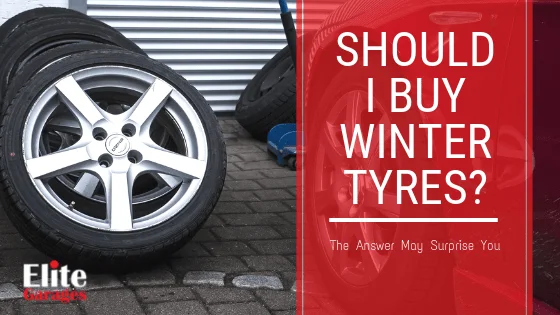
Should I Buy Winter Tyres?
The question many motorists ask is whether or not buying winter tyres is a worthwhile investment. While a new set of tyres may cost a couple of quid, judging from the UK weather conditions, it’s at least worth considering.
Tyre manufacturers and fitment centres constantly promote winter tyres but are they really worth it? There are several good arguments for (and against). However, can you put a price tag on road safety? Fact is winter tyres greatly improve traction and overall safety in typical UK winter conditions.
In some European countries, fitting winter tyres is a legal requirement but at the moment, most cars in the UK have summer tyres. Let’s take a look at some of the benefits of winter tyres and how they work.
What is the difference between summer and winter tyres?
Winter tyres are made from a softer compound which means they provide additional grip when driving in temperatures below 7 degrees. The tread pattern is also different featuring fine grooves (sipes) in each tread block that essentially increase the tyre surface in contact with the road. It’s also generally deeper to displace water better than conventional summer tyres.
They also remain supple in colder temperatures resulting in unmatched safety even when driving on snow and icy roads. If you live in rural areas or travel frequently for work or holidays, having a quality set of tyres could mean the difference between getting stuck and arriving at your destination safely.
Summer tyres, on the other hand, are made from a relatively hard compound. This means they will soften in milder temperatures which provide loads of grip but most often only in conditions above 7 degrees. While that’s great for driving in dry and warm weather, they are less useful when temperatures drop and the heavens open up.
How do winter tyres work?
The main reason why they have better grip on wet and icy surfaces is the ‘sipes’. We briefly mentioned this earlier but here is a more detailed explanation. The ‘sipes’ or fine grooves provide hundreds of extra edges to help grip the road as the tyre moves. They also enable localised movement of the softer rubber compound which clings better to the road. Compared to summer tyres, the larger single tyre tread block remains stiff in adverse conditions and unable to grip as effectively.
Winter tyres essentially collect snow and the deeper tread grooves and sipes provide exceptional grip in these conditions. While they perform admirably in snow and ice, they are more than that. Recent research indicates that winter tyres outperform summer tyres whenever the temperature is below 7 degrees. This means that cars fitted with winter tyres should stop faster and are much less likely to skid in any weather conditions if the temperature drops below 7 degrees.
The question of whether you need winter tyres in the UK is one of most hotly-debated topics. It all comes down to how much time you will spend driving in these conditions and at the low temperatures. If you frequently drive for business in adverse weather, you may want to invest in a separate set of tyres for winter. Simply swap them every October and March to experience the ultimate in road safety.
Alternatively, keep your summer tyres fitted if you don’t drive all that often or you could always buy all-season tyres. Their tread pattern is specially designed to perform in all conditions but they don’t match the performance level of summer and winter tyres in their respective extreme conditions.
Do winter tyres really make a difference?
If the above-mentioned information wasn’t proof enough, maybe this will help. The short answer is yes, absolutely! Winter tyres greatly reduce stopping distances in wet, snowy and icy conditions while also helping with cornering. This enables you to safely manoeuvre the car in situations where it could otherwise skid.
In terms of four-wheel drive cars, while it does offer better traction in snow and ice, it only provides a limited amount of extra help when cornering and none whatsoever when stopping. If you have a 4×4 fitted with winter tyres, you have given yourself the best possible chance to handle nearly any type of conditions.
Another question many people have asked is if they can drive on winter tyres all year. While it’s certainly possible, we wouldn’t necessarily recommend it. Remember, above 7 degrees the softer tyre compound gives the same effect as using summer tyres for winter driving. The result is simple – longer stopping distances and an increased likelihood of skidding around corners. Lastly, winter tyres wear quicker in higher temperatures so you will only end up replacing your tyres more often.
Conclusion
While the initial investment in a different set of winter tyres may seem costly, the benefits speak for themselves. More traction, more control, better handling and cornering when you need it most; wet, icy and snowy conditions. After all, safety should come first for you, your family and other road users.
If you have any concerns about what tyres are best for you, call your local Elite branch to discuss your winter tyre requirements. We have 13 branches nationwide offering a wide range of services on all makes and models. This includes MOTs, services, brakes, exhausts, clutch replacements, wheel alignment and batteries among others. Buy winter tyres today, find out more by contacting us through our website.
About Us
Opening Times
Saturday : 8:30–4:00
Sunday : closed
More Information
Contact UsCustomer Information Pack
Check MOT Due Date
Free MOT reminder
Careers


